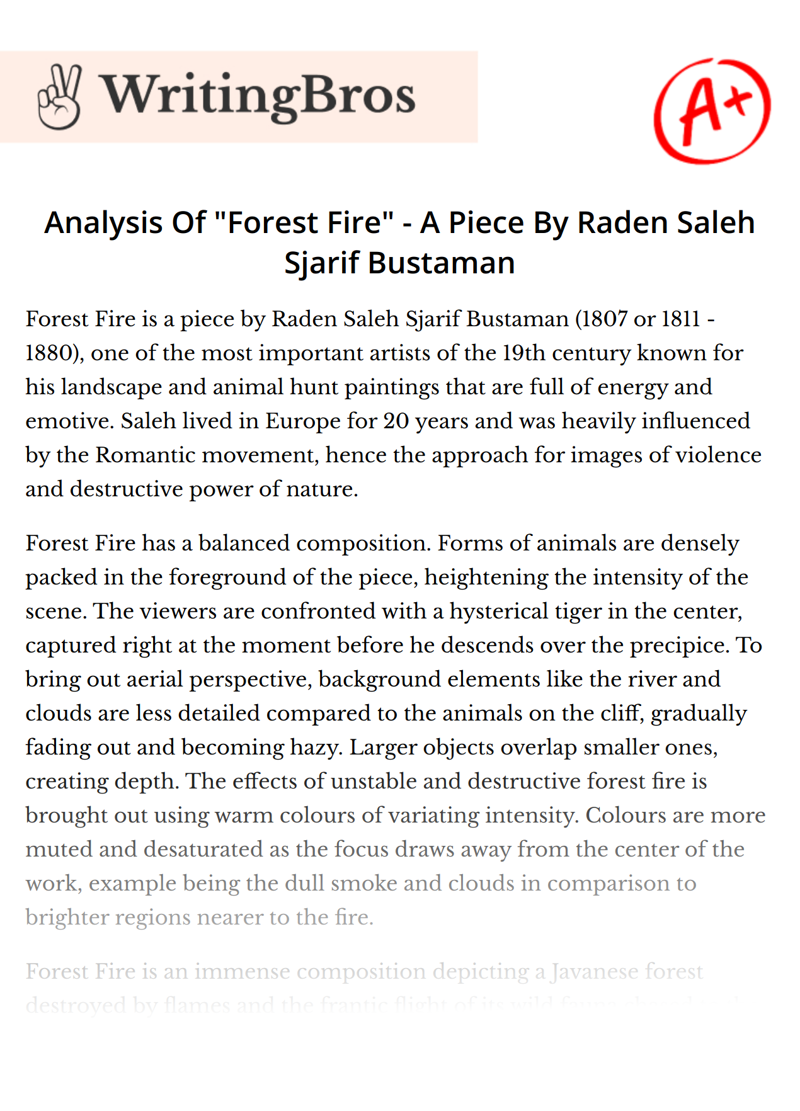Analysis Of "Forest Fire" - A Piece By Raden Saleh Sjarif Bustaman

Forest Fire is a piece by Raden Saleh Sjarif Bustaman (1807 or 1811 - 1880), one of the most important artists of the 19th century known for his landscape and animal hunt paintings that are full of energy and emotive. Saleh lived in Europe for 20 years and was heavily influenced by the Romantic movement, hence the approach for images of violence and destructive power of nature.
Forest Fire has a balanced composition. Forms of animals are densely packed in the foreground of the piece, heightening the intensity of the scene. The viewers are confronted with a hysterical tiger in the center, captured right at the moment before he descends over the precipice. To bring out aerial perspective, background elements like the river and clouds are less detailed compared to the animals on the cliff, gradually fading out and becoming hazy. Larger objects overlap smaller ones, creating depth. The effects of unstable and destructive forest fire is brought out using warm colours of variating intensity. Colours are more muted and desaturated as the focus draws away from the center of the work, example being the dull smoke and clouds in comparison to brighter regions nearer to the fire.
Forest Fire is an immense composition depicting a Javanese forest destroyed by flames and the frantic flight of its wild fauna chased to the edge of an escarpment. Saleh’s vivid depiction of animals and dramatic use of light and dark on a monumental scale powerfully narrates the relentless and tragic tale of life and death. Inhabitants of the forest are seen desperately trying to escape death. While we see the fierce struggle between predator and prey, fighting to get a safe footing on the cliff each dragging the other down for survival, birds effortlessly escapes from danger. This hints at how mere and insignificant the hierarchy of food chain is under the wrath of nature. Forest Fire embodies the essence of life and death. Before I give an answer I see a flower plays with the movement of hard-edge using clearly defined shapes, against the smoky drifts of grey and ochre. Woo introduces neutrality to the piece with the use of complementary colours, pink and green.
As Woo mentioned, he has a “preference to be able to be surprised by the way opposing elements form their way around each of my (his) paintings”, this is too reflected in this piece. Woo intentionally introduced tension among the elements to create rhythm, with the exploration of opposite hues and clashing textures. Simultaneous contrast of pale pink and muted green is deliberately used to bring out vibrance, which was further enhanced by the neutral wash of beige and ochre. The contrast of structural strokes against the lyrical organic lines suggests the idea of the movement within the static image. This stark difference denies the eye a resting place. Woo challenges the textbook principles of art and design with the use of opposing elements. Soft, subtle pink and green, symbolizing balance and gentleness, are placed against painted inscriptions of dark, expressive, gestural line strokes that shout the force, speed and emotion put into their making. The conflicting elements evokes complications, confusion and connections.
As said by Arshile Gorky, “abstraction allows man to see with his mind what he cannot see physically with his eyes, to perceive beyond the tangible. It is the emancipation of the mind. It is an exploration into unknown areas.” This artwork ties in with the theme Images of Ourselves as it holds up a mirror, questioning our subliminal self. It stirs conflict within each of us, confuses using complications of opposing elements. To experience and explore the art, the viewer must free his own mind of visual restrictions and connect with the emotions of the piece. The experience this artwork provides in highly personal and is different for each individual as the artwork evokes different emotions stemmed from one’s thoughts and perceptions.
Born in 1919 in the Jiangsu province of eastern China, Wu Guanzhong went on to become one of the most important Chinese painters of the 20th century. Renowned for landscapes which fused traditional Oriental ink wash traditions drawing with Western techniques of abstraction, Wu’s paintings have the colour sense and formal principles of Western paintings, but a spirit and tonal variations of ink that are typically Chinese. ‘A snake swallowing an elephant,’ is how Wu once described himself — the snake symbolising the Chinese artist in him, the elephant representing Western influence. Wu Guanzhong’s painting, Bamboos strongly ties in with the theme of nature, portrayed through the choice of elements in the piece. Combining a sense of whimsical hues and composition from Western painting with a spirit, lightness of touch and tonal variation of Chinese ink-wash painting, Wu created a duo-toned piece, expressing the feeling and ambience of the bamboo forest visually.
Cite this Essay
To export a reference to this article please select a referencing style below

